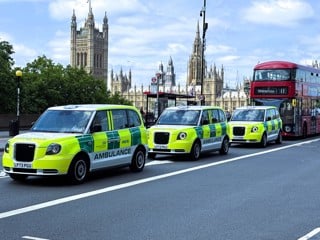“The ICFM course gave me the confidence to change our policy and write the driver handbook,” Maxwell says. “I got guidance from others on the course and was able to tweak their handbooks to create ours.”
The ICFM diploma will add to her skills and knowledge-base.
She has three sections as part of her project – administration and control, advanced finance, and acquisition and disposal, incorporating advanced interpersonal skills in all three – which will be presented back to the examiner and the rest of
the group.
Longhurst has been very supportive, giving Maxwell time off to enable her to undertake the research.
Much of Maxwell’s focus this year has been on implementing an online driver risk assessment and training programme via Cardinus.
All drivers, including essential users that drive their own car, will go through the programme. Maxwell hopes to add all grey fleet drivers once the core fleet is complete.
Cardinus will also carry out workplace assessments. High risk drivers will have further training via the Lincolnshire road safety partnership.
“Once we have completed the initial assessments, I will meet with our insurance company to discuss ways we can further improve and reduce our accidents and insurance premiums,” says Maxwell.
“We use our suppliers a lot to talk about how to improve our performance.”
Portraying an environmental image is crucial to the social housing group.
It has recently employed a sustainability manager and started fitting newly-developed homes with solar panels.
“It’s important for our image and our business that the company is as green as possible,” Maxwell says.
She has implemented a CO2 cap of 160g/km, but hopes to reduce that to 145g/km by the end of the year.
“Ideally I want to reduce the cap every year – we’ve not ordered a vehicle above 140g/km for a couple of years,” she adds.
Average fleet emissions are 120g/km. The low figure has been achieved by incentivising staff to choose more efficient vehicles.
In addition to the benefit-in-kind tax incentive, if staff reduce their CO2 emissions and don’t spend all of their allowance, they can have the cash back. Most drivers have taken up the offer.
Longhurst’s vehicles are on four-year replacement cycles. The fleet averages 15,000 miles a year, but the mileage is pooled – some cars go above, others go below.
“That works better for us,” says Maxwell.
Currently, employees can choose from 11 manufacturers, divided across seven options bands, but Maxwell wants to reduce the number on the choice list to improve discounts and lower the leasing rate.
Longhurst continues to grow its housing business, which will continue to add more vehicles to the car fleet.
Armed with her ICFM training and burgeoning contacts book, Maxwell will be more than a match for the larger fleet.
























Login to comment
Comments
No comments have been made yet.